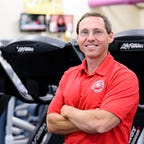You’re Not the Same Person You Were
Greek philosopher Heraclitus is credited with saying “no man ever steps in the same river twice, for it is not the same river and he is not the same man,” connoting the fact that “change is the only constant in life.” Our bodies are ever changing as well, adapting and evolving to the demands placed upon them. Your present body is the result of past adaptations and your future body will be the result of even more adaptations. The question, then, is “what will you require your body to adapt to?”
If you ask your body to adapt to sitting in a chair all day, with very little mechanical stress placed upon it, your body will gladly oblige. It will rid itself of those things that no longer seem necessary, like dense bones and strong muscles, and it will slowly deteriorate, as it appears that you need your body less and less. Likewise, the positive influences that regular physical activity provides to your cardiovascular and metabolic systems will no longer be influencing what happens in your body (and mind) and more and more of these systems and organs will begin to fail.
If, however, you require your body to adapt to some physical demands by placing loads on your muscles and bones, by getting your heart and lungs pumping and your blood flowing, and by moving your joints through wider ranges of motion, your body will adapt in a much more positive way. Bones will get, or stay, stronger; muscles will become, or remain, more functional and capable; your heart and lungs will be better able to deliver oxygen when needed; and you joints will hurt less, last longer, and move more easily.
Change is occurring all of the time and if you don’t make a focused effort to guide that change in the direction you wish it to go, it will take you places you don’t want to be. We lose 3–5% of our muscle mass each decade after the age of 30 — if we don’t do anything to prevent it — and muscle mass is really the difference between youth and old age, between function and dysfunction, between independence and dependence.
You might be able to say “I weigh the same today as I did on my wedding day 20 years ago” or “I still weigh the same as I did in college or high school” but if you didn’t use your muscles very much over that time span, you aren’t the “same” weight. During that time, it is likely you lost 10 pounds of muscle. So, that means, if you weigh the same as you did back then, but you lost 10 pounds of muscle during that time, then you must have replaced that 10 pounds with something else (hint: it wasn’t more bone mass or water weight). So, your scale weight might be the same but the make-up of your weight, your body composition, could be significantly different (and much softer).
That is what happens to the “average” person — they lose muscle and gain fat throughout their life — but that doesn’t have to be you and you can start to address that problem at any point in your life; it is never too late to start. You simply need to challenge your muscles, and bones, with real loads, real weight to push and pull against. You need to force your body to adapt and change in the direction you want it to go. Move a little more every day, lift some heavy things every day, and get your heart pumping a little every day.
Look ahead to what you want that future body to look like, and feel like, and start providing your present body with the need to adapt in that direction. Think about how you got to where you are now — if you like what you see, how you feel, and how you function, then keep doing what you’ve been doing. If not, try something else. Rivers keep flowing, time marches on, and our bodies keep changing but we can control how they change. You can decide what kind of man/woman steps into that future river based on the actions you take today. Good luck and keep moving!
